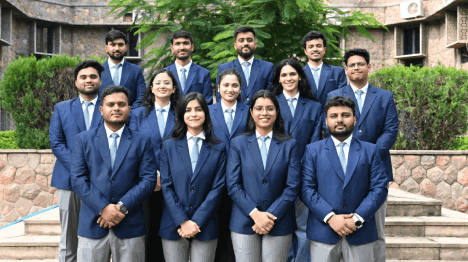- About Us
-
Academics
Schools
Programs
General Information
-
Faculty
The faculty members and researchers working at IIHMR University come from varied backgrounds including, but not limited to medicine, public health, management, economics, statistics, demography, human geography, social and behavioral sciences, rural development and pharmaceuticals.
-
Admissions
- Research
Publications & Journal
- Executive Education
Executive Programmes
- Online Certification Courses
ONLINE CERTIFICATION Courses
- Training
- Placements
- Contact
- Pradanya
- Blog
- Fee Payment
- NAAC
- IQAC
- NIRF
-
About Us
- About IIHMR University
- Board of Management
- Academic Council
- Board of Studies
- Research Board
- Institutional Review Board
- Finance & Audit Committee
- Departmental Research Committee
- Chairperson's Message
- President's Message
- IIHMR University Act
- Infrastructure
- Collaboration
- Ranking
- Board of Studies (School of Digital Health)
- Awards & Accolades
-
Academics
- Institute of Health Management Research
- School of Pharmaceutical Management
- ML Mehta School of Development Studies
- School of Digital Health
- SD Gupta School of Public Health
- MBA (Hospital and Health Management)
- MBA (Pharmaceutical Management)
- MBA (Development Management)
- MBA (Healthcare Analytics)
- Master of Public Health
- Student Manual – Cohort 9 (2021-2023)
- Master of Public Health (Offered by Johns Hopkins Bloomberg School of Public Health, USA in cooperation with IIHMR University, Jaipur, India)
- Ph. D.
- MBA CSR & ESG Management (Executive)
- MBA Sustainable Business Management (Executive)
- Common Information for all the Programs
- Academic Calendar
- Student Handbook 2020-21
- Committees
- Policies
- Annual Exam Calendar
- Library
- Faculty
- Officers of University
- Dean of Institute of Health Management Research
- Dean of School of Pharmaceutical Management
- Dean of School of Development Studies
- Dean of SD Gupta School of Public Health
- Dean of School of Digital Health
- School of Digital Health
- Faculty List A to Z
- Faculty List Designation Wise
- Faculty List School Wise
- Admissions
- Research
- Executive Education
- Training
- Placements
- Alumni
- Events
- Job Openings
- Contact
- Research
Baseline / Endline Survey for UNFPA Supported Integrated Population and Development Projects (Phase-II) in Rajasthan and Madhya Pradesh
Agency : UNFPA, New Delhi
In India, UNFPA support began in 1974 on the basis of a five-year programme cycle. The last programme cycle (Country Programme V: 1997-2002) had been completed. A major component of Country Programme (CP) 5 was a set of integrated Population and Development projects in 30 districts and 5 urban corporations spread across six states of the country. CP 6 had been designed to consolidate gains made during CP 5 as well as support interventions in new programme areas e.g. adolescent sexual and reproductive health (ASRH) and life skills, and violence against women and gender. Two blocks in each of the districts have special programme components.
In the light of the result-based management focus in the UNFPA programming, it was important to measure the achievements of the defined programme results. Thus, it was proposed that end line and baseline surveys be conducted for the project districts. Baseline data for CP 6 obtained through surveys served as the starting point for measuring or demonstrating changes in the situation and the performance of the programme.
Similarly, endline surveys were conducted for the project sites to assess the achievements of the programme objectives established for CP 5. The rapid household surveys conducted for the project districts during 1998-99 provided baseline estimates for key programme indicators as relevant to CP 5.It was proposed to commission surveys with the following objectives:
- To assess the achievements of the objectives for the IPD projects during CP 5
- To provide baseline estimate for CP 6
- To provide valid estimates on the outcomes and deliverable output variables so as to describe the situation prior to the proposed CP 6 programme
- To provide useful information for refining programme strategic interventions and activities



